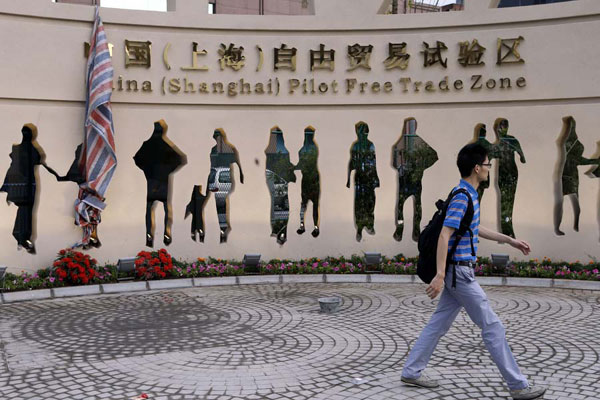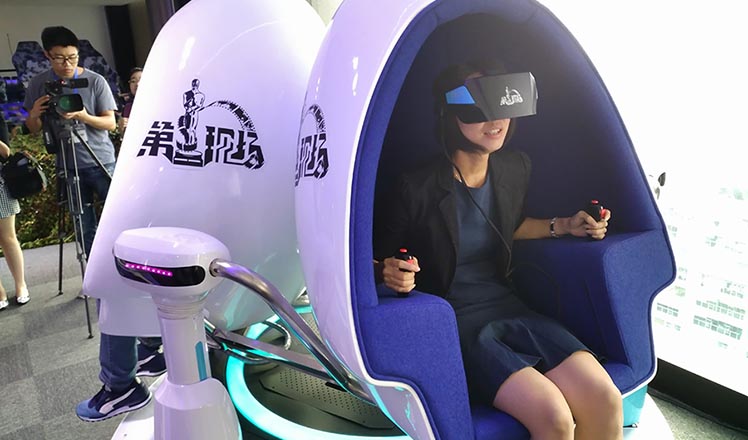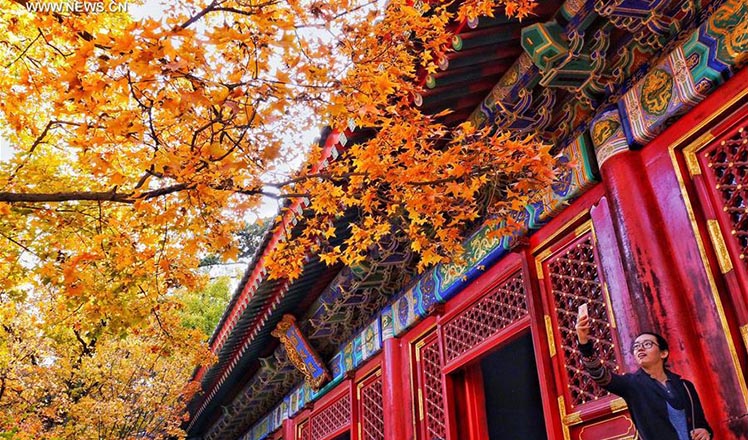Why open development is still important
Updated: 2016-10-29 09:04
By Robert Lawrence Kuhn(China Daily)
|
||||||||
 |
|
The name plate of the China (Shanghai) Pilot Free Trade Zone on a gate of the Waigaoqiao free trade zone in Shanghai. [Photo provided for China Daily] |
Why is "Open Development" the fourth of the Five Major Development Concepts-President Xi Jinping's guiding strategy to transform China's economy and society-when "opening-up" has been the core of China's policy for almost four decades?
In the 1980s, opening-up meant allowing overseas capital to manufacture low-cost products with cheap labor. Now that China has become the world's second-largest economy, but faces complex structural problems such as industrial overcapacity and higher labor costs, a new kind of opening-up is required.
What exemplifies China's new kind of opening-up? Free trade zones, the Belt and Road Initiative and Chinese companies going abroad.
I visited Shanghai to explore China's first free trade zone, established in 2013. What's the FTZ's impact on opening-up? I met the then chairman of the China (Shanghai) Pilot Free Trade Zone, Shen Xiaoming, also secretary of the Party's Pudong committee (he is now deputy Party secretary, Ministry of Education). I began by asking: Why are we still taking about "opening-up" when reform and opening-up started in 1978, 38 years ago?
"The same wording conveys different meanings today," Shen said, offering four aspects. "First, in 1978, 'opening-up' went in only one direction: we were only bringing in, not going out. Today, we both bring in and go out-two directions. Second, our original 'opening-up' meant importing overseas capital. Today, opening-up includes technology, trade facilitation, financial system reform, and more. Third, we used to depend on cheap labor and attracting overseas companies. Today, we forge our competitiveness in trade and systems. Fourth, opening-up back then was under strict government regulation. Today, the market plays a decisive role."
I asked Shen how the Shanghai FTZ exemplifies opening-up?
"The very core of an FTZ is to open up," he said. "We push for more reform through opening-up. For example, the concept of a 'negative list'-where the government specifies industry categories that are not allowed and you can do whatever you like as long as it is not on the list. The FTZ needs to be the 'ice-breaker': make breakthroughs and solve problems that used to seem unsolvable. The central government uses the FTZ as a 'field test' for new policies and a 'pressure tester' for international rules that may not work in China."
In 2015, China's foreign trade topped 24 trillion yuan ($3.54 trillion), unimaginable during the original opening-up. Now new FTZs have been established in Tianjin (for Beijing and Tianjin municipalities, and Hebei province), Guangdong province (coordinating with Hong Kong and Macao) and Fujian province (trade with Taiwan, the 21st Century Maritime Silk Road). More FTZs are in the works in six provinces and Chongqing municipality.
At the same time, China is building new models for international cooperation. In Xi's Belt and Road Initiative, China works with other developing countries, including some of the least-developed countries, to form a community of common interests seeking mutual prosperity. Building infrastructure is fundamental-roads, high-speed rail, seaports, airports, power plants and telecommunications. These are what developing countries need and this is where Chinese companies can compete. Leveraging domestic experience and economies of scale, China offers quality construction, reasonable prices, attractive financing and rapid timetables.
China is also opening up, when Chinese companies purchase foreign companies, acquiring technology, management, brands, markets and channels of distribution.
China is not further opening up to please foreigners. It is doing so as a domestic necessity. Today opening-up means much more than it meant three decades ago; it now means making it easier, faster and better to do all kinds of business.
Opening-up also means foreign companies should enter more industries in China, and have fewer restrictions, so that intensified market competition will pressure Chinese companies to innovate and improve. The ultimate winners? Chinese consumers!
In short, China's new kind of opening-up means expanding the mind and enabling China's economic transformation.
The author is a public intellectual, political/economics commentator, and an international corporate strategist. He is also host of Closer to China with R.L. Kuhn, a weekly show on CCTV News (Sundays 9:30 am and 9:30 pm).
- Hefty award offered for deciphering oracle bone characters
- China Daily brings you 'sixth plenums' in past 35 years
- Party ramps up supervision
- 400,000 migrant workers flock to Xinjiang to harvest cotton
- China anticipates booming job market in 2016
- Online shopping platform selects cat as 'chief cute officer'
- Asia American leaders discuss civic engagement
- World's disabled get new champion
- Clinton, Michelle Obama make first joint campaign appearance
- Miss Philippines wins 2016 Miss International Beauty Pageant
- Trump's Hollywood Walk of Fame star destroyed
- Maduro activates Defense Council to seek solution to crisis

 2016 Comedy Wildlife Photography Awards Finalists
2016 Comedy Wildlife Photography Awards Finalists
 NINED VR creates splash with virtual reality products
NINED VR creates splash with virtual reality products
 Splendid Sichuan captured in photos
Splendid Sichuan captured in photos
 Chinese baozi shop gains popularity in Harvard Square
Chinese baozi shop gains popularity in Harvard Square
 Chinese mariner on record-breaking voyage goes missing
Chinese mariner on record-breaking voyage goes missing
 2045-square-meter photo mosaic breaks world record
2045-square-meter photo mosaic breaks world record
 Red leaves reveal beauty of autumn
Red leaves reveal beauty of autumn
 Tibet mandala: The world in a grain of sand
Tibet mandala: The world in a grain of sand
Most Viewed
Editor's Picks

|

|

|

|

|

|
Today's Top News
'Zero Hunger Run' held in Rome
Trump outlines anti-terror plan, proposing extreme vetting for immigrants
Phelps puts spotlight on cupping
US launches airstrikes against IS targets in Libya's Sirte
Ministry slams US-Korean THAAD deployment
Two police officers shot at protest in Dallas
Abe's blame game reveals his policies failing to get results
Ending wildlife trafficking must be policy priority in Asia
US Weekly

|

|









